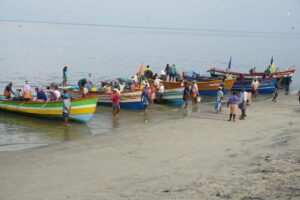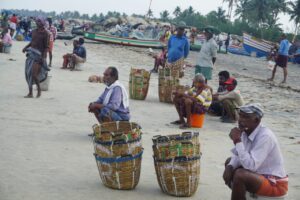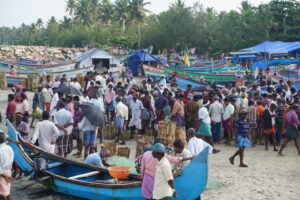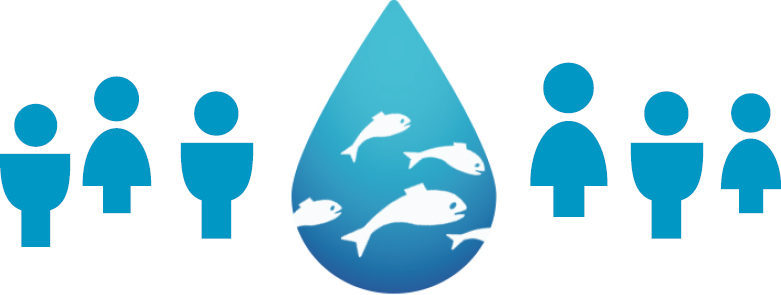Maintaining the health between people and water
Maintaining the health between people and water: Improving marketing to ensure nutrition along the fisheries value chain

In the global south, where most of the fish producing nations and global population coexist, the gap between the demand and supply is yet apparent. There have been concerted policies by governments to ensure adequate and nutritious food for citizens while international trade continues to play an important role in food systems especially concerning seafood. The Pradhan Mantri Matsya Sampada Yojana in India is a broad policy framework which, in addition to fish production and consumption, attends to the development of better and innovative marketing channels. This becomes particularly relevant in the context of the pandemic.
The COVID pandemic has impacted both the supply and demand of fish. Our work spanned across coastal states in India and covered more than 800 consumers (in addition to other stakeholders in the sector). It pointed out that while there was an increase in fish landings following the “forced fishing holiday”, the consumers showed greater willingness to pay if the fish was from a trustworthy source. These changes indicate the importance in understanding the involvement of crucial stakeholders along the marine fisheries value chain (i.e. the marketing functionaries) to address relevant issues partially or wholly. By marketing functionaries, we include diverse actors from the fisher community: credit facilitators, purchase auditioners, fishing harbour workers (loading and unloading of fish), ice factory workers, and those transporting fish to the point of sale (wholesale or retail). While differences among these actors pertain, they can be classified into two types of marketing functionaries: credit suppliers and labour suppliers.

Over the years with increasing industrialisation in fisheries, the role of the credit facilitators has become indispensable. The rising fuel costs and the desire to reduce fossil fuel use have led to the decrease in the fossil fuel subsidies from the government; this has increased the dependency on the facilitators of credit of the boat owners. However, the transition to move fisheries away from the fuel dependence while eliminating the credit dependence must be seen as a long-term measure rather than an ad hoc solution.
A move in this direction was witnessed in a fishing village in central Kerala with the Fisheries Cooperative Society (associated with the government). They provided temporary credit and facilitated the auction of the catch. It is worth noting that the scale of operation was smaller than the average due to the pandemic and the village was able to garner institutional and non-institutional support through local self-government initiatives and a general climate of awareness due to being affected by coastal erosion. Thus, one could say that the ground was fertile for local community supportive interventions.

In this context, we propose two policy interventions, which we believe have important implications across consumers, fisher folk, traders as well the community at large:
(1) Pay closer attention to locally available food sources and supply chains to ensure an uninterrupted food supply within existing frameworks such as Public Distribution System and institute provision within legal frameworks (e.g. the National food security Act in the context of India). This will not only provide a market for local commodities but also bring attention to how pricing/price signals occurs in the fish market.
(2) Marketing is crucial when accessibility and affordability are concerned. Marketing may also be important in mitigating the issue of ‘adverse selection’. Clearer, reliable, and uniform standards of marketing need to be set up so that the role of intermediaries can be reduced to the minimum. To implement such, it is necessary to know the cost of hidden information which results in adverse selection in the fisheries sector. Studies have shown that the fisher’s share was highly variable among species, and a lower share indicated that there was greater profitability for the middlemen/intermediaries rather than for the fisher folk.
* Marketing functionaries in our study comprised of Auction agents, labour involved in transportation, ice plants, Commission agents, Trade Union Activists.
** Adverse selection or the hidden information problem in public choice theories refers to how crucial and timely the information regarding a product and/or service is.
Project description:
The research programme aims to understand the impact of the COVID pandemic on the marine fisheries sector through diverse stakeholders in this sector in India. It is designed to be undertaken during 2022-24 and is fully funded by the Indian Council of Social Science Research [Project code: 1013588 Scheme Code: 0877/Sanction order: FNo.G-12/2021-22/ICSSR/RP]. This programme covers 14 sites (both rural and urban) across the 9 coastal states in India. Data were collected through structured questionnaires designed for 7 specific stakeholders: labourer, boat owner, trader, marketing functionaries, consumers, exporters and women.
Publication: Shyam, S. S., Akhila, K., Anuja, A. R., & Narayanakumar, R. (2022). Gauging the impacts and externalities of covid pandemic in marine fisheries sector of India: “Building Back Better”. Journal of Fisheries and Livestock Production, 10(11), 1-9.
For more information, please contact:
Project Director: Dr Shyam S Salim (shyam.icar@gmail.com)
Project Co-Directors: Dr R Narayanakumar and Dr Anuja A. R.
Research Staff: Ms Akhila Kumaran (akhilakn90@gmail.com)
Affiliated Institution: Indian Council of Agricultural Research-Central Marine Fisheries Research Institute, Kochi, India
